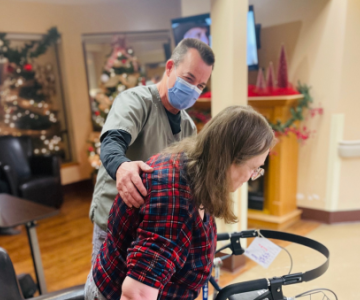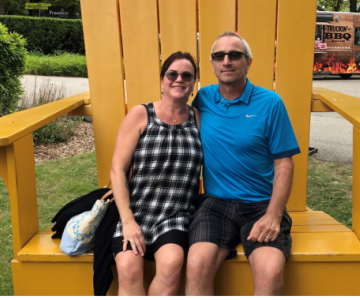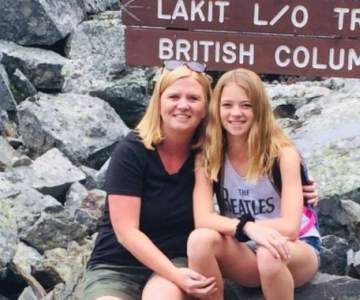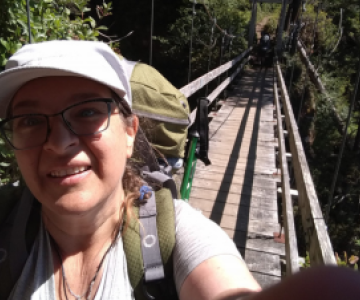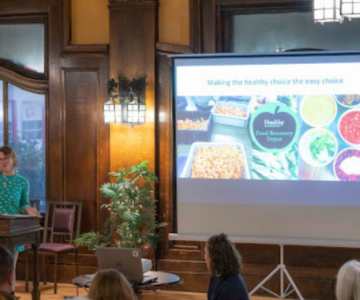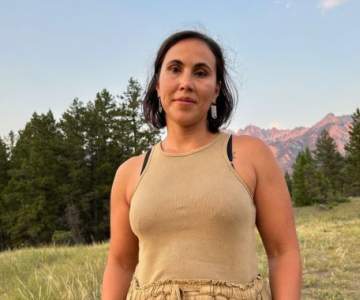Breadcrumb
Explore Stories
Health & Wellness
Misplaced keys. A forgotten name or password. Forgetting a special occasion like a birthday.
As we age, many of us start to worry memory loss means we are getting dementia or Alzheimer’s disease. It’s normal for us to be concerned.
According to the Alzheimer Society of Canada, almost 40 per cent of us will experience some form of memory loss after we turn 65 years old. It’s a natural part of aging.
Even if you experience memory loss as you age, the chances are still low, however, that it’s dementia. The World Health Organization estimates that 5–8 per cent of us will live with dementia at some point in our lives.
Community & Culture
Name: Dwayne Schroeder (he/his/him)Job title: Health care assistantYears of service: 11Worksite: Three Links ManorCommunity: KelownaAncestral territory: Syilx OkanaganAdvice to live by: Live and let live
Dwayne Schroeder has spent over 11 years with Interior Health as a health care assistant (HCA), but if he had his way that number would be a lot higher.
“I wish I would have started earlier,” he said.
After Dwayne’s previous career in the food industry ended, he was on the hunt for a new opportunity. His wife suggested he enroll in the Health Career Access Program because he is great with people. It’s clear that Dwayne was wise to follow his wife’s advice.
“I did very well in the course and after graduation I was able to gain employment with Interior Health,” Dwayne said. “I have loved it ever since.”
Community & Culture
Name: Marilyn Winters (she/her/hers)Job title: Registered NurseYears of service: 32 yearsWorksite: Kamloops Home and Community Health—North Shore Community: KamloopsAncestral territory: Whispering Pines/Clinton, T’kemlups, Simpcw, Secwepemc, Neskonolith, Adams lake, and Little Shuswap nations. Advice to live by: Let's not dwell on the problem, let's figure out a solution.
Marilyn Winters has dedicated 32 years of her life as a health-care professional to the service of others and her community. After completing her degree from Thompson Rivers University, and becoming a registered nurse in 2012, Marilyn devoted her time, and passion, to helping and caring for her patients across the Interior Health region.
Community & Culture
Name: Debbie French (she/her/hers)Job Title: Nursing Unit ClerkYears of Service: 21Worksite: East Kootenay Chronic Kidney Disease ClinicCommunity: CranbrookAncestral Territory: Ktunaxa NationFavourite Quote / Advice to Live By: Work hard, be nice, eat tacos.
Debbie French is a nursing unit clerk at the East Kootenay Chronic Kidney Disease (CKD) Clinic in Cranbrook. She enjoys working with people and helping them fulfill their kidney health needs. She describes herself as hard working and loyal, both on the job and in her personal life. She admits she can also be “fiercely protective” as well with friends and family.
Community & Culture, Health & Wellness
Written by Alexis Blueschke, public health dietitian with Interior Health
Food can provoke strong emotions and memories, especially around the holidays. Developing a positive relationship to food can not only help in creating a healthy outlook on life, but also a love for ourselves—all year round.
I have been on a life-long journey developing a positive relationship with food. One of my key learnings has been the connection to intuitive eating.
Community & Culture
Name: Jennifer Turnbull (she/her/hers)Job Title: Child Care Licensing Officer Years of Service: 16 Worksite: Kamloops Public Health UnitCommunity: KamloopsAncestral Territory: SecwépemcFavourite Quote / Advice to live by: “Look for something positive in each day, even if some days you have to look a little harder.”
By day, Jennifer Turnbull is helping make sure daycares in the Thompson and Cariboo regions are running smoothly.
“I still really like working with children. I have an ECE [early childhood educator] background and worked in daycares for 10 years before I came here,” noted Jennifer, who has been in her role with Interior Health for 16 years.
Health & Wellness
Food security is top of mind for many people and communities right now. Over the past three years, the COVID-19 pandemic, heat domes, wildfires, floods, inflation, and the rising costs of food have contributed to food insecurity. While all of these factors have been overwhelming, communities are coming together to prove their resilience and are building stronger relationships in response.
In 2021, United Way of BC (UWBC) was looking to support and build on these connections and approached folks across many communities to establish its Regional Community Food Hub program. Seeing the work being done by UWBC, Interior Health reached out to support the Regional Community Food Hubs across the region.
Health & Wellness
Aniko Farkas enjoying nature. Photo credit: Brandi Lee Photography
Aniko Farkas became a social worker out of her deep-rooted desire to help others. As a sociable, charismatic 35-year-old, she loves her work in both hospital and community settings, and embraces the challenges and rewards of supporting those with physical and psychological injuries. She never imagined she might one day need to call on the kinds of support she was accustomed to providing to others.
In August 2020, Aniko witnessed a client's death in the course of her job. The loss of this particular client unleashed the pain from a decade of traumatic events, leading to such psychological damage that she would need more than a year off of work to heal.
At the time, Aniko continued to work and told herself she was okay, until January 2021 when it started to become clear that she was not.
Aniko (L) and Seija (R) celebrating Seija's “World’s Best Boss” award. Photo credit: Brandi Lee Photography.Seija Emond, who was a team lead at Cedar Sage Health and Wellness (now known as Access) was training Aniko. Seija recognized Aniko was experiencing burnout and pushing herself past healthy limits.
Aniko was working many hours in multiple positions, averaging 65-70 hours per week, to avoid thinking about what she had witnessed. While Aniko was continuing to do her job well, Seija began to grow worried about her, and continued to check-in with her.
When Aniko notified her team that another client had become unresponsive over the phone, and was calling 9-1-1, Seija left a leadership meeting to support Aniko in working with emergency responders to save the client's life.
“I didn’t want you to experience this alone,” Seija said as she comforted Aniko.
It's because of Seija’s thoughtful, empathetic and supportive leadership that Aniko felt safe enough to share with Seija that she wasn’t okay when Seija gently enquired about how Aniko was handling burnout. Seija didn’t hesitate to support Aniko in taking the needed time off work.
“Originally when I went off work it was for three weeks,” she says. “I couldn’t have predicted then what the next year would look like.”
Once Aniko stopped pushing herself to work, and gave herself the space and time she needed to recover, the impact of what she had been through set in.
For the first two months, Aniko was exhausted, sleeping up to 20 hours a day. That soon developed into crippling anxiety, with daily panic attacks, nausea, and an overwhelming fear of leaving the house. Her cognition was also affected — she was unable to read or retain information.
Aniko and Jaxx. Photo credit: Brandi Lee Photography.Aniko was diagnosed with post-traumatic stress disorder (PTSD) with derealization — a state of mind where you feel disconnected from your surroundings and the people you care about.
“I experienced dissociation on and off for months,” she explains. “I’d drive to the store and sit in the car to try to be normal, try to be a part of the world. But I wasn’t in it, thinking how do I interact with this world I see?”
Slowly and steadily, Aniko began her journey to recovery. The turning point in Aniko’s treatment was being connected with an occupational therapist, who took an incremental approach, listening carefully to Aniko’s experiences and tailoring treatment to her abilities.
Each step helped Aniko repair the broken connection between her body and her brain. As her health improved, she began to work with a somatic therapist, who focused on the physical side of recovery.
Her support team then began to focus on a gradual return to work. Aniko’s occupational therapist began helping Aniko rebuild confidence in her clinical skills and providing her with the knowledge and tools to manage physiological warning signs. Jesse Giddens, a regional representative from Interior Health’s Enhanced Disability Management Program (EDMP), reached out to Aniko to begin discussing what a gradual return to work could look like.
“Jesse was amazing. It was a breath of fresh air when he called. Knowing he was supporting me in going back to work felt incredible. It was like the two pieces connected. WorkSafe and my support team at Interior Health supported me with my leave, then IH's EDMP liaised with my occupational therapist who handled everything with my gradual return to work.”
“This was huge because being off work was super scary, and to have someone to take care of what needed to be done, the logistics, planning, training etc.— it was a lot for me to return to work, and they took care of everything. All I had to do was show up. I cannot say enough about how supported I felt and how grateful I am to have had that kind of support in a very difficult time in my life.”
Aniko describes the first couple weeks of her gradual return to work as a “shock to the system,” but says things slowly began to fit into place through exposure and routine. She practised her grounding strategies, took breaks when she felt overwhelmed, and used what she’d learned in counselling and occupational therapy to work through her fear and anxiety.
Enjoying nature’s ice rink. Photo credit: Brandi Lee Photography.After six weeks of supernumerary shifts, she returned to regular full-time duties in June 2022 — 17 months after she originally went off work.
Today, Aniko is a social worker for the Injectable Opioid Agonist Treatment (iOAT) program and the social worker for Kelowna Integrated Court (KIC). She's also in school full-time completing her Master of Social Work through Dalhousie University.
Aniko is proud of how far she’s come, and credits her recovery to an amazing team of health practitioners, IH's EDMP, and her steadfast, supportive friends. She also credits the four standout Interior Health staff who supported her gradual return to work and are her “go-to” supports: Carol Overn, Launa Wagner, Kyra Macpherson and Thomas Lait.
Community & Culture
Name: Tanya Momtazian (she/her/hers)Job Title: Registered MidwifeYears of Service: 16Worksite: Kootenay Lake HospitalCommunity: NelsonAncestral Territory: Ktunaxa and Syilx. “I live in the Sinixt, Ktunaxa, and Syilx territory of the West Kootenays. Sinixt is not on the territory map because it was declared extinct by the federal government, which has recently been repealed.”Favourite Quote / Advice to live by:
“I enjoy consulting and considering the iChing, an ancient Chinese Book of Changes. It talks about perseverance, harmony, planning, and strategy.”
Born and raised in Calgary to a white settler father from Alberta and a mixed ethnicity mother from Trinidad and Tobago, Tanya is the first midwife to join Interior Health’s Navig8 Emerging Medical Leaders Program, which prepares medical leaders to operate effectively in their current and future leadership roles through a mix of action-based learning and mentorship. With a deep passion for patient care, Tanya holds a number of midwifery-related roles while finding time to pursue outdoor activities with her family, and trying her hand at silversmithing and jewelry making.
-
Load More
Showing 270 of 786
Sign up for email updates
Receive news, alerts, public service announcements and articles right to your inbox.



